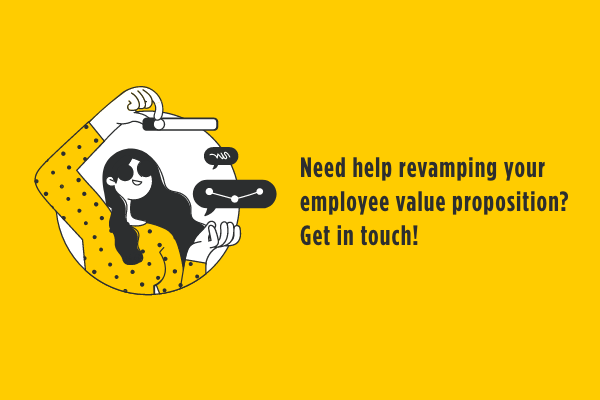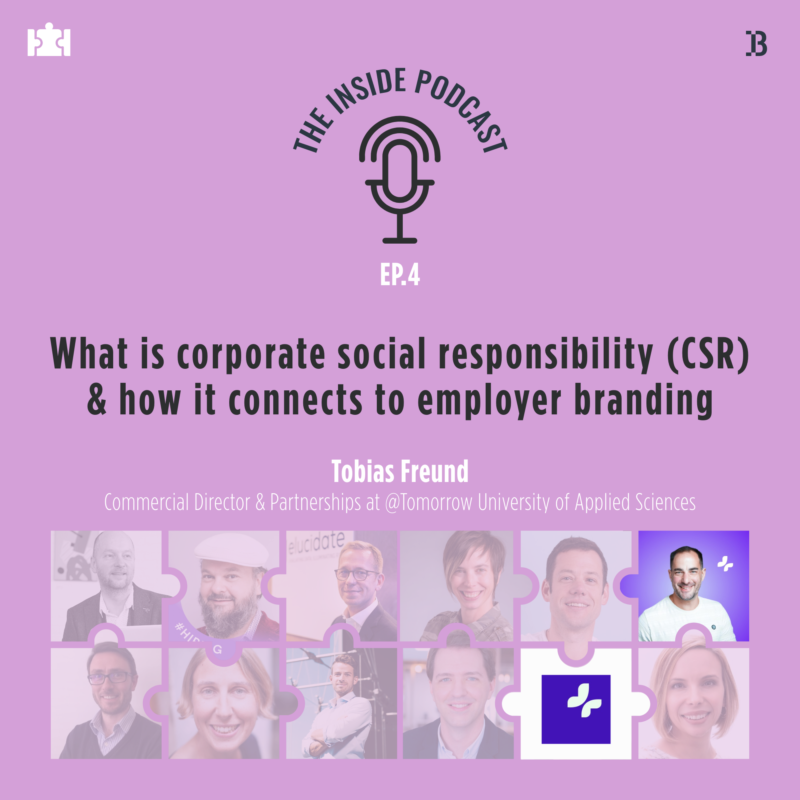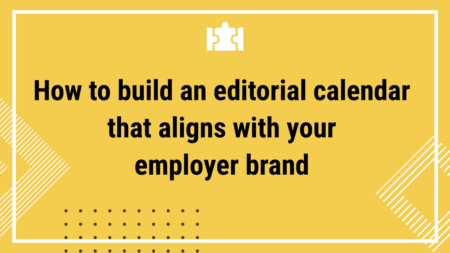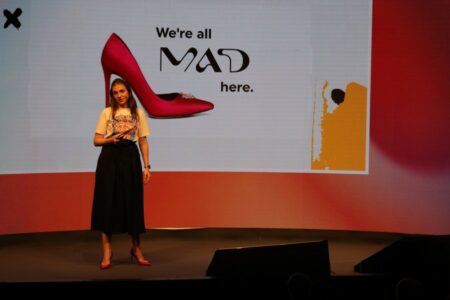Overview
In the 4th episode of our 5th season, we spoke with Tobias Freund, Commercial Director & Partnerships at Tomorrow University of Applied Sciences. We talked about some of the core challenges of employer branding in Germany today, as well as the implications of corporate social responsibility (CSR), and the connection between strong CSR initiatives and high employee retention.
Tune in to learn more about the main drivers of purpose in employer branding, leadership involvement in strengthening company culture, and a lot more. Enjoy!
What you’ll learn by listening
- Employer branding challenges: why is implementation so difficult?
- Leadership involvement in strengthening company culture
- Branding & company culture in Germany: funkiness vs seriousness
- An overview of CSR & its main implications
- How employer branding connects to CSR (corporate social responsibility)
- The connection between strong CSR initiatives and high employee retention
- Product & company culture: the two main drivers of purpose in employer branding
- How important is diversity in strengthening organizational culture
About Tomorrow University of Applied Sciences (ToU)
Tomorrow University of Applied Sciences (ToU)*, is the first European startup to launch a world-leading institution focused on educating future generations to create solutions for a more sustainable society. Make an impact in the areas of sustainability, entrepreneurship, and technology by earning a bachelor’s or master’s degree with us. All of our programs are completely remote allowing you to study, work, or travel all at the same time. Industry experts are your mentors. You’ll learn alongside a cohort of mission-driven peers who come from all over the globe on our cutting-edge learning platform — we don’t simply take offline learning online.
On Spotify | Employer Branding: The Inside Podcast S05Ep.4
S05Ep.4: podcast transcription
Georgiana: Hi everyone! This is Georgiana with a new episode of Employer Branding: The Inside Podcast. My guest for today is Tobias Freund from Berlin. Welcome, Tobias! Thank you so much for talking to me today. Tobias is actually a multiple entrepreneur with solid experience in founding, acquiring, and exiting startups. And the reason I got in touch with him basically is that he has a very vast experience in entrepreneurship, in CSR, and employer branding.
But what really attracted my attention is the way that he transforms CSR into Employer Branding tactics or uses it for employer branding tactics. And we’ll get into that in just a little bit. Tobias first, please introduce yourself and let us know what you’ve been working on recently because you’ve worked on many, many companies and many projects. So maybe just tell us a few things about the most important ones for you?
Tobias Freund: Yeah. Hello, Georgiana. Thank you for having me. Yes, I mean, you mostly set just from a meter perspective for what I’m doing. But mainly my focus, at the moment, is CSR and purpose-driven activities. So this is a very important topic, that everything I do, and everything I want my employees to do is really purpose-driven. My background is technology in the b2b sphere, and software as a service, if we want to narrow it down a bit on the product side.
Georgiana: It’s always interesting for me to talk to people who know the tech scene in Berlin and in Germany overall, because my experience so far in working with companies in both Germany, Romania in the United States has been that employer branding is applied differently throughout the continent and throughout all these countries. And I was wondering, in your opinion, what do Berlin companies do? Well, when it comes to employer branding, what do they claim they do, and don’t really do in reality?
Tobias Freund: Well, whereas the second one is a bit hard to tell because I can’t really look behind the doors of the industry in Berlin in general, I think that Berlin itself has a certain attraction, especially when it comes to attracting new talent. I mean, it’s a metropole that has audited claims to be a lot in terms of diversity and the chances to develop oneself.
And I think that this is basically true. There are not many places in Germany as a definitive, but even in Europe, that can deliver such a variety and so much potential to people. But then, it’s fast-paced, and I think now we come to the employer branding side, I think most startups want to claim this to themselves as well to be fast-paced, and I think most of them are.
But they really play the card. Right? So we are from Berlin, we are really cool. We are hyper International, and we are super open to diversity. Yay. And so when it comes to the second part of your question, like, so to say that they are not really keeping what they promise. I think some, some make it too easy for themselves, like just putting a kick a table or a ping pong table into a meeting room and saying, Hey, this is new work. So obviously, this goes hand in hand with the resources a company has, and startups in general normally have very tight resources. I wouldn’t blame them for doing it. But just to say, hey, we’re from Berlin, and we offer free beers on a Friday and we have a ping pong table is not enough. And I think that might go into your second question, like, who is not doing a good job and they definitely exist.
Georgiana: I’m working out of Hamburg today, and at WeWork in Hamburg has free beer between 5 and 7 pm. And that was a bit strange, probably part of the same package that some companies offer their employees when it comes to employer branding, tangible offerings, and tangible benefits.
However, I’ve seen with that in many instances, budgets are much more consistent in the medical sector. For example, that was quite a surprise for me to find out that various hospitals in Germany are running Employer Branding programs that to me were really new. In Romania, for instance, they wouldn’t even think about it, although all the doctors in Romania are going to Germany and France. And I was wondering, what’s your take on it? Why do startups in Germany don’t really develop the employer branding initiatives that they would want to? Is it just a matter of budget? Or is it something else?
Tobias Freund: I think in the past 10 years, there was such a hypothetical thing. They didn’t really need to. I think this is now, especially under the current circumstances of inflation and the money that is in let’s say the CV market, so this is not changing. But there was no big need. And on the opposite, if you take the medical sector, there’s such a huge gap of need to get the right employees in, especially throughout COVID, this was very transparent.
And this was not always a matter of money, even though I mean, public health care. Is it sad to be really good in Germany, but I mean that there are funds missing. But when it comes to employer branding, I think that they had much earlier than the need to transfer what they offer to the outside. And so this might be the reason that you found the medical sector to be very proceeded in this way. And this might change now due to current circumstances. I said that startups have to really figure out ways to brand themselves much earlier than they used to have.

Georgiana: It was speaking about leadership, because it goes hand in hand with employer branding, of course. How much should leadership get involved when it comes to company culture? And how much do they really do in Germany, where I’ve discovered that many, many companies have very conservative cultures.
Tobias Freund: From my perspective, it’s a must. The leadership needs to be connected in basically all the people’s activities because the culture is, is one of the most relevant factors for a company to succeed, especially in a growth phase. So if you can’t, as a leader, keep the culture and enhance the people together to stay in one direction, the business is most likely meant to go out of business soon. Because then this is like a chain reaction.
If the culture is rotten to a certain extent, people believe that this will then get other people also to leave. And then this is a process that is hard to block at a later stage because you lost your credibility. When it comes to Germany overall, again, from a meter perspective, I think this really depends on the maturity of a company if it’s already well set, kind of older family business. Outside of the bigger cities, there are definitely very conservative views and is delegated to some manager and say, well do something about employer branding, and maybe a bit CSR. So check behind it. And please let us do the way we did the past decades.
But I experienced and came across many of actually these companies that realized it needs to be different. And then they went in, like with full force. And these are the ones that I really think are doing a great job. Let’s say there’s the hidden champion that is producing some kind of special screw that is exploited all over the world and is a multi-billion industry and some money is really not the meta why things are being done or not. And when these kinds of companies realize, okay, well culture has developed in the past decades and we need to develop now when this happens, then you have some really some role models but saying this, this is still a minor fraction.
Georgiana: Are there things that you have discovered Germany does really well when it comes to company culture or employer branding? Or that Germany is doing in the same way, let’s say?
Tobias Freund: No. I mean, branding themselves as a German company is always a bit critical or has been critical in the past. Because there are so many stereotypes about being German. And what I found interesting is that, especially in a more globalized world that many companies didn’t take them very seriously themselves, so they had funny ad stared at it really said, Well, we are, we are not that serious company and try to make people aware that this German stereotypes might not always apply. And I found it very, very interesting, especially to, I mean, what in the advertising direction. But also that more and more companies implement the doer.
So the informal approach when speaking to people, I mean, just as the biggest example, at one of the I think it was two years ago, one of the last board meetings and investor meetings of Mercedes, the head of the board came on stage with sneakers, white sneakers and without a tie. So this was a complete breach of all protocols that you should normally do. And now you can see that there is something going on. And I think this was also assigned to a Tesla and CO to say, Well, hey, we can also do a startup and we are also funky. And we have a very international view on things and this in all other areas, I mean, that as a certain development. And I really work on this development that people pull in. Bigger companies search for two ways to brand themselves more modern, and less, let’s say, German.
Georgiana: Yeah, well, so do I, because I intend to stay in Germany. So I look forward to it. I also have to mention during this podcast that what attracted me to your LinkedIn profile is the fact that you initiated martial arts clubs that actually produce international champions. And I’m always fascinated by these people who have a very rich career and professional life, and then still find some time to dedicate to personal or, let’s call it community responsibility projects. Maybe you can talk to us a little bit about this project in particular, and then a little bit about your newest initiative. And in the end, let’s see how Employer Branding connects to corporate social responsibility because it’s a perspective that I haven’t looked at before.
Tobias Freund: Actually, when I founded my first club I think I was 16; the earliest age you are allowed or entitled to found a nonprofit or sports club in Germany. And I just did it because I liked my sports. And I thought, well, maybe I do it better than others, who are a bit bored. But I found my first club. And by that, I mean, obviously, I learned certain leadership’s in there, especially in martial arts, you need to have kind of natural respect.
But you can play this card all the time. So I think it brought me to points that I could use at a later stage in my business life as well. But the second club I found, was actually in Vienna. And I was already managing my first startup, and I did it a bit more consciously. And we had a very wide variety of white-collar boxing. So people like managers coming back in the evenings, but also really, like socially disadvantaged youth. And this was something that I learned to bring them together over on the fundament, that is really a common ground for them. So the manager has no power to delegate anything to the 16-year-old migration playground. And it was just up to how much they respected each other.
And if they could learn from each other, this was a good experience and I still find it very valid in day-to-day business. When you have like young people coming in. I’m around my 40s now and when I got interns from a different culture, I’m so intrigued by what they know and what they do. And I really try to stay curious all the time. Because they definitely bring things in, that everyone can participate in and nurture. And so this is something I really learned in this phase of my life.
Georgiana: Yeah. And then, of course, CSR in employer branding?
Tobias Freund: This was basically my first touch point with CSR. But yes, I think there’s a big shift. And you can argue about certain movements. But I think Fridays for the future did a good job to make things aware in society. And now we have many different movements from intrapreneurs future, for instance, grandparents or future, whatever, you could basically use any part of the society here. And I think this is a good chance, but due to COVID. And also, now due to the war in Ukraine, I mean, these things have moved back and priority, which I understand.
But I mean, it’s not off the table. So I think for me as a father, for everyone has been an active part of the society, it’s a duty to not get this out of sight. And my honest opinion, I think, is the biggest duty in politics, yes, but politics is always thinking in terms of the next four years or five years, depending on where you’re from, and if they get voted again. But what is a constant in our society is the economy and all the private health businesses. And this is where the money is. And this is where the power is, and also to have an influence on the politics. So this is the angle, but I think we have the biggest leverage. And that’s why I’m really committed to my past ventures, to influencing those businesses, being more active, and doing more.
Because the nation is just okay, here’s my money, do something good with it, and that’s fine. But I think if we can return something useful, by donating, by spending money, by investing money into a greater good, then I think corporates are much more willing to do so. And then here we are with employer branding. I think if you connect employer branding and corporate social responsibility, there’s a benefit on the one hand for managers that rather think like economic KPIs.
And on the other hand, you have got a positive output. And for me, it’s really important that there’s a shift in thinking that doing good and having a good impact on society and the environment does not necessarily mean nonprofit. It’s actually the opposite if we make impact companies profitable, and a good place where they can spend a good amount of money to pay the employees, to brand themselves positively, to be a really a game changer in the economy, only then we can reach their goals. If you still keep them in the corner as a nonprofit and you earn money with that by doing good. How does it work? I think this is really the wrong thinking. And this is something that my last venture with the current venture, we broke up and like the current one is, with education, which I hear we are getting with a sports club, educating people, this is something where I really believe is big leverage in.
Georgiana: And basically, Tomorrow University is a connection or facilitates a connection between university students and companies? Did I understand correctly?
Tobias Freund: Yes, this is one part. So basically, first of all, it’s a fully remote, or let’s say remote-first university with an accredited degree. So you can have an accredited bachelor’s or master’s degree in there. So that’s important to know. And secondly, the corporates I work with can basically decide whether they want to upskill current employees. And that’s also important because we have an older generation of employees that don’t have the skills that are important for let’s say, the next five to 10 years, and then they need to be laid off. And this is also a very expensive undertaking, while you upskill them with the skills you need to be sustainable to be technological savvy, or to have like entrepreneurs and residents that like to take parts of your company to a different level to diversify. So these are basically the fields that we advocate and Tomorrow University is technology, sustainability, and entrepreneurship.
Georgiana: And in what you’ve seen so far in the ventures that you found it and maybe and other companies in Germany as well. Have you discovered any direct correlation between good and strong CSR initiatives and high employee retention? How do employees respond to these?
Tobias Freund: I can only rely here on studies. And the studies said that, especially during COVID, there was a big differentiation between companies that were assessed are active and those that weren’t. And this leads, again, to what I initially said, I think the purpose is one of the sets of factors, whether companies can keep the employees satisfied and happy in the long run. Because it wasn’t an American study, I’m not sure, but I just read a few months ago that if you earn above a certain amount of money, it doesn’t really matter anymore. So I think it was about around 4000 EUR. So if you earn 5000 EUR, it doesn’t matter if you’ve gone 6000 EUR or more. That’s nice, but it won’t keep you with the employer if your purpose is not covered.
And, and then, I mean, the only way to deliver purpose to your employees, just two things is your product or your culture. And the culture cannot sustain, if you just are like looking to the inside, let’s say what the revenue is, how many customers you have, like justice, economic code factors, but if you deliver, you can be our accountant, but at the same time, you can learn how to be influential in the company to make it more sustainable. If you can drive initiatives like that there are many different parts. I mean, it’s not just about education, it’s also volunteers. Yes, there’s volunteering, which I find really useful. But I mean, on the other side, you can’t force people to go somewhere and do good with a bit within any social project.
So I think you need to have a decent portfolio or, even better, you have a product that is intrinsically purpose-driven. And where I aim to like the people that the students that we educated, they are the intrapreneurs of the next generation, that have the solution to like in a way that all the carbon dioxide that are able to make our seas and polluted that is whatsoever. I mean, there are so many, so many fires that we need to extinguish. And if you are in such a company, then as an employer, you have big advisors because you don’t need to care too much. You need to care, but you don’t need to care as much for your employees to be to have a purpose as those who are just selling a smart home.
Georgiana: This is very, very valuable input. Because usually when we talk to our clients about recruitment marketing campaigns, or about what we can do in terms of employer branding for them, we always look inside and try to put on social media as much employee-generated content as possible. But what you’re saying now reinforces to me the belief that you can do so much outside of the company as well, and then use it as a way to attract people to reinforce your purpose. And yeah, in the end, to gain awareness. So it really makes a lot of sense. And they definitely will look at that more closely.
Tobias Freund: Also, don’t get me wrong, because I set the example with a smartphone producer. I mean, we all use smartphones, so we all need smartphones, and you can look into many other products, the couch I’m sitting on right now, that to produce that probably won’t give many purposes to the people who produce it. And in this case, you know, you’re forced to look on the outside of why you can like enrich your company with purpose and activities. And I think being socially engaged, is a good way to do so.
Georgiana: Absolutely. And since we’re approaching the end of this discussion, I wanted to touch a little bit on diversity and inclusion. I will also be talking about this topic next week with another guest exclusively about diversity and inclusion. So I was wondering, in your opinion, how important is diversity and strengthening organizational culture? And how far ahead is Germany with regards to this topic? Right? If you’re, let’s say the pay gap.
Tobias Freund: I think diversity in general, is a driver for innovation. Because as I said, initially, I listened carefully to the entrance of, let’s say, 18 years, which is also a diversity factor. But I always think that whoever has the competencies to work in a different, uncertain position, not only brings in the competencies like, to the hard facts like to, let’s say to recode, as a developer, or to write nice posts, as a social media manager. They have a big stack of skills that are outside of their actual position.
And I think what employers need to be aware of is that you can actually make use in a positive way, from this skill set that people bring, apart from their original skill set, why they were hired for initially. And the more diverse people are, the more skills you can have access to. And that’s a huge advantage, especially in bigger organizations to drive innovation, because their way of thinking is always different. If I have my company only like 100 sittings there, how boring would the meetings be? No, I would only have nodding people, just repeating what I just said. So I mean, is speaking literally here, the more diverse, the more input I get. And the more open I stay to this input, the better I can become.
Saying this, I mean Germany is quite a huge country. There are structures that have been things, there’s also sometimes, you know, this thing is okay, we always did it like that. So why should we change it? So it was okay in the past decades. So, payment. So pay gap is one of these topics. So but I see first efforts for equal pay straightaway. It’s a very difficult topic, I have to say, being in charge of payrolls. It’s not easy to tackle, because you have actually to look into every case individually. But in general, looking at the statistics again, and also taking into consideration that most women if they have children are out of business. So if we look at the total salary they get over their life, there must be a cut in between to support this biological topic. There are efforts and I highly support these efforts. I think it’s behind that there are still discussions about male and female advantages or disadvantages is a big problem.
Georgiana: We’re slowly getting there, probably in Germany.
Tobias Freund: I’m really sure we are getting there. As I see good movements, especially with the price of the internet, the access to information, the more transparency is getting in. And this makes it harder for very stubborn managers to stay as they are. I don’t think this will be very sustainable.
Georgiana: Hopefully. And the last question is, where do you see employer branding in Germany a few years from now?
Tobias Freund: I see that it’s getting more and more important. And the more we are confronted with the outcomes of the climate crisis, the more we see how much needs to be done. But also refugee topics, and there’s a pressure, there’s growing pressure, unfortunately, because this means that there are unfortunate people out there and there’s a miss, there’s a wrong development in the environment. So this development can’t be ignored. That’s why I strongly believe that CSR and all those topics will gain more and more importance.
Georgiana: Tobias where can people find you?
Tobias Freund: Like all the business people, on LinkedIn. This is a good way to connect. Otherwise in one of my sports clubs.
Georgiana: This has been very valuable. Thank you so much for your time, and good luck growing your newest venture. Thank you very much.
This was Employer Branding: The Inside Podcast. You can find our podcasts on Spotify on Apple podcasts and content on employer branding-related things on employerbranding.tech. Until the next time, stay tuned.







